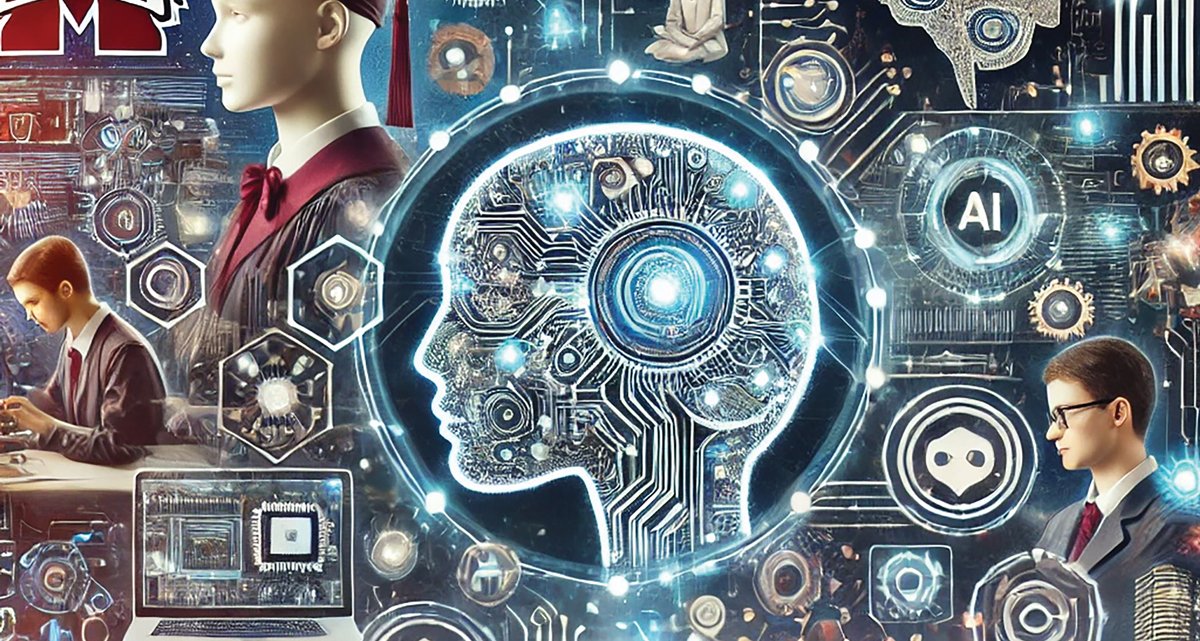Artificial intelligence: MSU positions itself to lead southeast in AI studies across disciplines

With the artificial intelligence market projected to soar to $1.3 trillion by 2032, Mississippi State University and other postsecondary institutions are leading the charge to equip the workforce with essential AI skills.
With the introduction of its Bachelor of Science in Artificial Intelligence degree last year, Mississippi State became one of a handful of universities – and the first in the Southeast – to offer an undergraduate degree in the rapidly expanding field.
“We wanted to make sure our students in the Computer Science and Engineering Department were the ones developing the AI systems, and not only that, but also taking those AI systems and applying them to various areas,” said Computer Science and Engineering professor and Interim Department Head Andy Perkins in an interview with The Dispatch.
The program, which welcomed its first cohort in fall 2024, was designed with the future demands of the AI industry in mind. As companies like OpenAI, Google and Meta brought generative AI, which creates new content using models trained on existing data, to the forefront, Perkins said MSU was looking for a way to get ahead of the curve.
“In a way, we observed what was happening at the time and got a little bit ahead of everybody else to introduce this to make sure Mississippi State grads were the ones taking the lead,” he said.
The program starts with a solid foundation in computer science followed by an in-depth study of AI concepts, like machine learning, human computer interaction and algorithms. But the program is not limited to technical courses, Perkins said.
“We also have students take courses in things like cognitive science, which deals with how humans think. If you’re going to teach a machine how to think, it may be helpful to understand how humans think,” he said. “They also take an ethics course because we hear a lot about the ethics of AI. I think it’s important … to make sure that everyone understands the ethical implications of the things that we do with computers.
The degree culminates in a capstone project where students engage in AI research or work on AI-related projects, many of which are done through industry partnerships, Perkins said.
“We will work with industry partners to pair student teams up on developing AI systems, applying AI in a specific area related to our industry partner and to be able to get that real world experience in developing and using AI systems for a specific industry,” he said.
While generative models have only recently garnered mainstream attention, AI has played a role across industries for centuries, Perkins said. From healthcare to entertainment to finance, it is a tool anyone can take advantage of – no matter their career – if they know how to use it, he said.
A newly approved minor in AI at MSU aims to give students across disciplines a chance to incorporate AI into their degree whether it’s in computer science, psychology or even performing arts.
“This is for anybody at the university, not just computer scientists or engineers,” he said. “It can be people in the humanities or the arts that want to learn the basics of how artificial intelligence works, how are some of the models developed and then how they can apply it in their job after they graduate.”
Making AI education more accessible
MSU, along with East Mississippi Community College and Mississippi University for Women, is a part of the Mississippi Artificial Intelligence Network, which is a statewide network of partners working to make AI education more accessible to students and professionals in and outside of the computer science industry.
MAIN Director Kollin Napier said the network was created in response to the need for workforce-ready skills when it comes to AI.
“The idea (for the network) came because all of these institutions … were asking the same questions of how do we better prepare our students out of a community college going straight to work or out of a four year university going straight to work to meet that industry demand?” he said.
Napier said there is a misconception that working in or with AI requires an advanced computer science degree.
“When we talk about AI skills for the workforce, it’s enabling anyone and everyone – regardless of their background, their discipline, whatever route that they’ve taken in their career – to understand how they can pull up … a tool and ask the right questions,” Napier said.
The network’s first partnership cohort of partners included all 15 community colleges and five universities across the state.
Through these collaborations, anyone can access more than 10 AI-focused courses, offering 64 hours of content ranging from introductory AI principles to specialized topics like AI in manufacturing or sustainability. Partnerships also create opportunities for industry collaborations, real-world AI projects and career pathways for participants.
As of 2024, MAIN enrolled more 1,200 Mississippians in an AI course, including more than 2,000 K-12 educators in the program.
“What we’ve been able to accomplish is just making that available and accessible across the board,” Napier said. “The key benefit to all of this is that it is accessible to everyone in the state, whether that’s higher ed, K-12, workforce, young or old. It’s free. There’s no cost involved to anyone.”
STORY BY EMMA MCRAE
OPENING IMAGE BY DALL-E ARTIFICIAL INTELLIGENCE / OPEN AI




